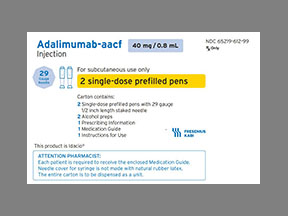
Adalimumab-aacf (2 Pen) Coupons & Savings Card – Discount Prices from $887.35
Adalimumab is a medication used to alleviate pain and swelling associated with various types of arthritis, including rheumatoid, psoriatic, juvenile idiopathic, and ankylosing spondylitis. It also treats specific skin conditions like plaque psoriasis and hidradenitis suppurativa. This drug works by inhibiting a protein in the immune system known as tumor necrosis factor (TNF), which contributes to joint inflammation and damage in arthritis, as well as the formation of red, scaly skin patches in psoriasis. As a TNF blocker, Adalimumab helps reduce joint swelling, thereby minimizing further joint damage and maintaining joint function. Additionally, it is prescribed for certain bowel diseases, such as Crohn's disease and ulcerative colitis, and for an eye condition called uveitis. This overview includes various forms of Adalimumab, such as adalimumab-aacf, adalimumab-aaty, adalimumab-adaz, adalimumab-adbm, adalimumab-afzb, adalimumab-aqvh, adalimumab-atto, adalimumab-bwwd, adalimumab-fkjp, and adalimumab-ryvk.
Our coupons are free to use. Before paying, show the pharmacist your Adalimumab-aacf (2 Pen) savings card to get your free discount. Use our filters below to edit the prescription box to match your needs. The Adalimumab-aacf (2 Pen) prices will update based on your prescription needs. Above our Adalimumab-aacf (2 Pen) coupons, you can change your location to see pharmacy prices and costs in other areas. We're here to help you buy Adalimumab-aacf (2 Pen) at the lowest price with our prescription discount card.
My prescription
Edit
40MG/0.8ML, Adalimumab-aacf (2 Pen) (1 Auto-injector Kit)
Select pharmacy

Albertsons
$887.35
COUPON PRICE
Walgreens
$904.45
COUPON PRICE
Walmart
$940.66
COUPON PRICEAdalimumab-aacf (2 Pen) savings card
Show this card to your pharmacist
Albertsons
$887.35
BIN
ID
PCN
GRP
019876
LH0F98E242
CHIPPO
LHX
Powered by
Adalimumab is a medication used to alleviate pain and swelling associated with various types of arthritis, including rheumatoid, psoriatic, juvenile idiopathic, and ankylosing spondylitis. It also treats specific skin conditions like plaque psoriasis and hidradenitis suppurativa. This drug works by inhibiting a protein in the immune system known as tumor necrosis factor (TNF), which contributes to joint inflammation and damage in arthritis, as well as the formation of red, scaly skin patches in psoriasis. As a TNF blocker, Adalimumab helps reduce joint swelling, thereby minimizing further joint damage and maintaining joint function. Additionally, it is prescribed for certain bowel diseases, such as Crohn's disease and ulcerative colitis, and for an eye condition called uveitis. This overview includes various forms of Adalimumab, such as adalimumab-aacf, adalimumab-aaty, adalimumab-adaz, adalimumab-adbm, adalimumab-afzb, adalimumab-aqvh, adalimumab-atto, adalimumab-bwwd, adalimumab-fkjp, and adalimumab-ryvk.
Our coupons are free to use. Before paying, show the pharmacist your Adalimumab-aacf (2 Pen) savings card to get your free discount. Use our filters below to edit the prescription box to match your needs. The Adalimumab-aacf (2 Pen) prices will update based on your prescription needs. Above our Adalimumab-aacf (2 Pen) coupons, you can change your location to see pharmacy prices and costs in other areas. We're here to help you buy Adalimumab-aacf (2 Pen) at the lowest price with our prescription discount card.
Adalimumab-aacf (2 Pen) dosage forms
Use our Adalimumab-aacf (2 Pen) 40MG/0.8ML coupon with prices from $887.35 for 1 Auto-injector Kit.
Dosage Quantity Price from Per unit 40MG/0.8ML 1 Auto-injector Kit $887.35 $887.35
| Dosage | Quantity | Price from | Per unit |
|---|---|---|---|
| 40MG/0.8ML | 1 Auto-injector Kit | $887.35 | $887.35 |
